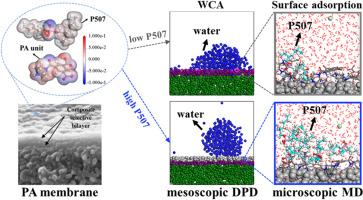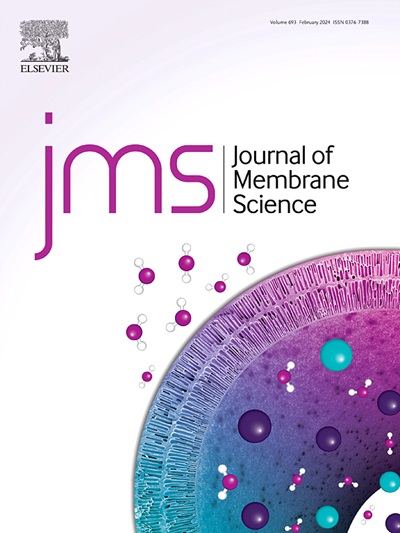Multiscale insights into polyamide membrane fouling during reverse osmosis of rare earth wastewater
IF 8.4
1区 工程技术
Q1 ENGINEERING, CHEMICAL
引用次数: 0
Abstract
The rare earth elements (REEs) industrial wastewater is characterized by high ammonium nitrogen and low-strength organic compounds. Reverse osmosis (RO) process is effective for the REEs wastewater treatment. However, membrane fouling deteriorated the RO process. In this work, the fouling mechanism during RO process of REEs wastewater was elucidated via multiscale methods. A series of bench-scale fouling tests with simulated REEs wastewater containing high NH4+–N and different concentrations of 2-ethylhexyl phosphonic acid mono-(2-ethylhexyl) ester (P507) were performed with a commercial RO membrane to evaluate the fouling extent of the RO process. A critical P507 concentration (0.25 mg L−1) was observed where the fouling pattern changed qualitatively. When the P507 concentration was lower than 0.25 mg L−1, the relative flux increased and the membrane surface became more hydrophilic. When P507 reached this critical point, severe fouling occurred accompanied with a more hydrophobic membrane surface. Multiscale simulations [i.e., molecular dynamics (MD) and dissipative particle dynamics (DPD)] revealed that the fouling layer network varied with P507 concentration. This work provides in-depth insights into membrane fouling mechanism in the REEs wastewater, and has enlightening significance for fouling control strategies and the innovation of anti-fouling membrane materials.

对稀土废水反渗透过程中聚酰胺膜堵塞的多尺度研究
稀土元素(REEs)工业废水具有高铵态氮和低强度有机化合物的特点。反渗透(RO)工艺可有效处理稀土元素废水。然而,膜污垢会恶化反渗透工艺。本研究通过多尺度方法阐明了 REEs 废水反渗透过程中的结垢机理。使用商用反渗透膜对含有高 NH4+-N 和不同浓度的 2- 乙基己基膦酸单(2-乙基己基)酯(P507)的模拟 REEs 废水进行了一系列台架规模的污垢试验,以评估反渗透过程的污垢程度。观察到一个临界 P507 浓度(0.25 毫克/升),在此浓度下,污垢模式发生了质的变化。当 P507 浓度低于 0.25 mg L-1 时,相对通量增加,膜表面变得更加亲水。当 P507 浓度达到临界点时,膜表面疏水性增强,出现严重污垢。多尺度模拟(即分子动力学(MD)和耗散颗粒动力学(DPD))显示,污垢层网络随 P507 浓度的变化而变化。这项工作深入揭示了稀土废水中的膜污垢机理,对污垢控制策略和抗污垢膜材料的创新具有启迪意义。
本文章由计算机程序翻译,如有差异,请以英文原文为准。
求助全文
约1分钟内获得全文
求助全文
来源期刊

Journal of Membrane Science
工程技术-高分子科学
CiteScore
17.10
自引率
17.90%
发文量
1031
审稿时长
2.5 months
期刊介绍:
The Journal of Membrane Science is a publication that focuses on membrane systems and is aimed at academic and industrial chemists, chemical engineers, materials scientists, and membranologists. It publishes original research and reviews on various aspects of membrane transport, membrane formation/structure, fouling, module/process design, and processes/applications. The journal primarily focuses on the structure, function, and performance of non-biological membranes but also includes papers that relate to biological membranes. The Journal of Membrane Science publishes Full Text Papers, State-of-the-Art Reviews, Letters to the Editor, and Perspectives.
 求助内容:
求助内容: 应助结果提醒方式:
应助结果提醒方式:


